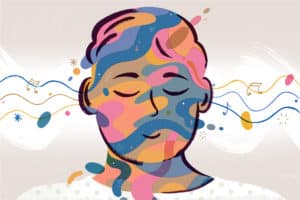Three Ways to Engage in Music At Home With Your Loved One
By Amy Standrdige, MM, MT-BC
Music has been used to entertain, energize, soothe, and intellectually stimulate human beings since Biblical times. Many people in today’s culture claim to have little musical abilities, but music is more easily accessible now than ever before. You might be looking for ways to use music to connect with your loved one or caregiving client but are not sure how. Even if you can’t sing like Michael Bublé or play the trumpet like Louis Armstrong, there are many ways you can engage in positive musical experiences at home. Here are a few to try today.
Even if you can’t sing like Michael Bublé or play the trumpet like Louis Armstrong, there are many ways you can engage in positive musical experiences at home. Here are a few to try today.
- Listen to music together. This might bring back memories, bring energy and smiles, or even inspire a dance party! There are many convenient ways to access music at home using your phone, YouTube, or a CD or record player. If you have an Amazon Alexa, all you have to do is tell her to play whatever music you like. Say, “Alexa, play Big Band favorites,” or “Alexa, play 70s funk and soul,” or “Alexa, play Blue Suede Shoes!” She is a very good listener, and if she can’t find exactly what you’ve asked, she might say, “I couldn’t find that one, but here‘s a similar station you might enjoy ”
- Watch a musical or an opera together. The Metropolitan Opera is offering free streaming of encore presentations from their “Live in HD” series. Find out more about the Metropolitan Opera here. Are you more into musicals? Here is an article listing 17 popular Broadway shows and where to find them online. Selections include Hamilton, Rent, and Peter Pan.
- Dance! Movement to music can be as simple as tapping your toes to Frank Sinatra, marching in place or in your seat to a Sousa March or a Military fanfare, or doing the Twist with Chubby Checker. Always take necessary safety precautions when there are balance issues that might result in a fall, and always encourage – never force. What your loved one or client feels like doing from day to day is likely to change. If at first you don’t succeed . . .
Research shows that music is processed globally in the brain, making it a powerful medium for positive change. Even just listening to a favorite song engages brain structures responsible for audition, cognition, movement, emotion, and even respiration. For more information or to find out about individual or group music therapy services, contact Amy at Oak Song Music Therapy.
Amy Standridge is a board-certified music therapist (MT-BC), humorist, and director of Grace Notes Community Choir for older adults and their care partners. Oak Song Music Therapy can be found on the web at www.oaksongmusictherapy.com, on YouTube, by email at amy@oaksongmusictherapy.com, or by phone at (512) 657-1432. You can listen to an interview with Amy – HERE.
